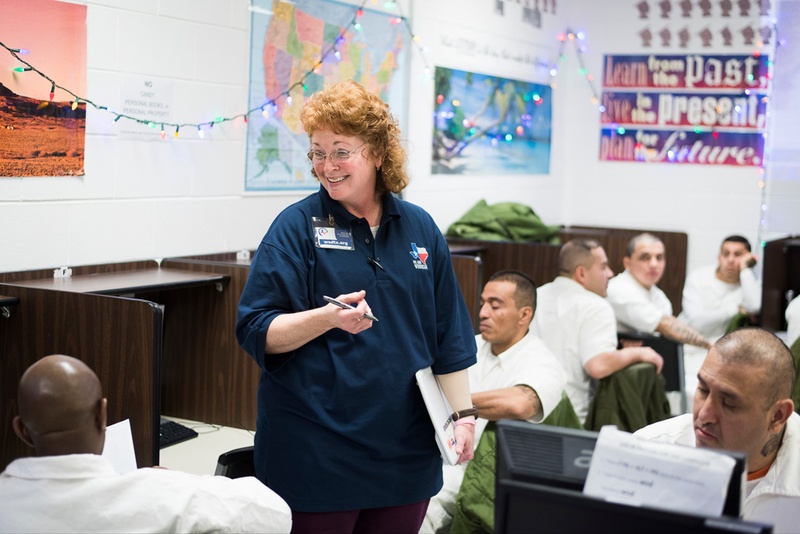Federal Government to Fund College Courses for Texas Inmates
More than 2,500 Texas inmates will participate in a national experiment starting next month, using federal money to take college courses.
For decades, the federal government has banned the use of Pell Grants funds for such rehabilitation efforts. But last week, the Obama administration launched the Second Chance Pell Pilot Program as a way to study whether reinstating Pell Grants for prisoners might boost their chances of finding employment. Nationwide, up to 12,000 inmates, all of whom are set for release within five years, will be eligible to earn a certificate, associate’s or bachelor’s degree while incarcerated.
“Promoting the education and job training for incarcerated individuals makes communities safer by reducing recidivism and saves taxpayer dollars by lowering the direct and collateral costs of incarceration,” U.S. Secretary of Education John King Jr. said in a statement.
Texas provides some inmates access to education through the Windham School District. But steep budget cuts in 2011 by the Legislature forced the statewide prison education system to eliminate more than 250 full-time positions and reduce its program.
Three of the nine Texas schools participating in the national pilot — Mountain View College in Dallas, Southwest Texas Junior College in Uvalde and Wiley College in Marshall — will be offering prison-based education for the first time. The programs include a mixture of liberal arts and vocational training courses.
For Lee College’s prison program in Huntsville, the pilot would build on a 50-year-old program offering certificates and associate’s degrees to offenders in the Texas prison system. The school currently teaches about 1,200 inmates, according to Donna Zuniga, dean of the college’s Huntsville Center. Federal funding will allow enrollment to grow.
“I have absolute faith that this will reduce recidivism,” Zuniga said. “Ninety percent of them are going to get back in the community, and I would want, at least the ones around me, to be educated and have a chance to apply for jobs and get a livable wage so they don’t have to resort to crime.”
Cedar Valley College in Lancaster is using the federal aid to re-establish its prison education program. Ruben Johnson, executive dean of the college’s Business and Technology Division, said budget cuts at the Texas Department of Criminal Justice had forced the school to stop offering certificates and associate’s degrees to inmates in 2012, after more than 10 years. Now, about 120 inmates from the Sanders Estes Correctional Center in Venus are expected to enroll in its Air Conditioning and Refrigeration Technology certificate program.
“It will definitely ease the financial burden. It will also give [inmates] some hope to enter the workforce, so they don’t have to go back to the lifestyle they used to live,” said Johnson. He added that the state should allocate funds to further expand rehabilitation programs.
A 2013 RAND Corporation study funded by the Department of Justice found that inmates who participated in correctional education programs were 43 percent less likely to return to prison. Those inmates were also 13 percent more likely to have a job after finishing their sentence.
Texas, which has the country’s largest prison system with more than 150,000 inmates, pays an average $20,000 each year per inmate.
Congress voted to ban prisoners from receiving Pell Grant funds in 1994 as part of a broader crime bill signed by President Bill Clinton. At the time, some critics argued that money spent to fund prison education was unfairly reducing aid to traditional college students.
King, the education secretary, said the pilot program costs less than 0.1 percent of the overall $30 billion annual budget that funds the Pell Grant program for college students — about $30 million.
The Second Chance Pell Pilot is part of the Obama administration’s effort in re-evaluating some longstanding barriers that prevent people with criminal records from getting jobs and affordable housing. However, the White House received some pushback from Republicans last summer, when plans for the pilot were first announced.
“This may be a worthwhile idea for some prisoners, but the administration absolutely does not have the authority to do this without approval from Congress,” U.S. Sen. Lamar Alexander, R-Tennessee, said at the time.
Other conservatives charge that the pilot program is focusing on the right problem but with the wrong solution.
“It shows that at least we’re affirming that education should be a part of rehabilitation,” said Derek Cohen, deputy director of the Center for Effective Justice at the Texas Public Policy Foundation, a conservative think tank. “Are Pell Grants the right way to create the policy? I would say no.”
Rather than restoring Pell, Cohen said Congress should pass proposed reforms that would cut some sentences and ease re-entry after prison.
Zuniga, who has been working with the Lee College program for 30 years, said the value of educating prisoners can’t be underestimated. There’s no more rewarding feeling than seeing her students entering the world of work after completing a stint in prison, she said.
“If you have ever been to one of our annual graduations, you would see their families come, and maybe for the first time they have something to stand up and clap about,” said Zuniga.
Disclosure: The University of Houston has been a financial supporter of The Texas Tribune. A complete list of Tribune donors and sponsors can be viewed here.
This article originally appeared in The Texas Tribune at http://www.texastribune.org/2016/06/29/thousands-texas-inmates-will-get-federal-aid-earn-/.






